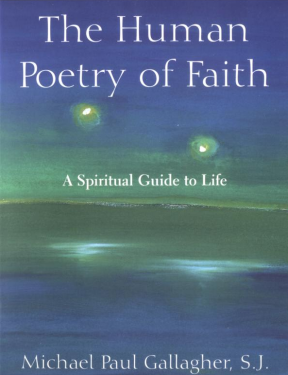This is the fifth column in a series
 IN HIS “The Human Poetry of Faith: A Spiritual Guide to Life” (New York: Paulist Press, 2001, pp. 142), Father Michael Paul Gallagher, S.J., suggests that if people are going to appreciate the “surprise of Christ,” then they have to take time to think about what is deep in their own lives. They have to set aside quiet time to allow what is deepest in them and most important to them to come to the surface. Our culture doesn’t encourage this type of activity and the pace at which we live does not make it easy to be in touch with what is deepest in us.
IN HIS “The Human Poetry of Faith: A Spiritual Guide to Life” (New York: Paulist Press, 2001, pp. 142), Father Michael Paul Gallagher, S.J., suggests that if people are going to appreciate the “surprise of Christ,” then they have to take time to think about what is deep in their own lives. They have to set aside quiet time to allow what is deepest in them and most important to them to come to the surface. Our culture doesn’t encourage this type of activity and the pace at which we live does not make it easy to be in touch with what is deepest in us.
Father Gallagher claims that if we give ourselves quiet time, we will soon be thinking about our relationships. He believes that if we listen to our own human depths with imagination and quiet, some major concerns will surface for us. One of those concerns he identifies is human relationships and the path to love.
One of the great blessings in life is friendship. As I age I appreciate friends more than ever. Perhaps I am becoming more reflective. Perhaps I am allowing myself more quiet time than I have in the past. Perhaps I am more grateful for life’s gifts. Whatever the reason, friends are almost at the top of the list when I reflect on what blessings I have received in my life and what I consider most important in my life.
Years ago, a number of men I knew well resigned from the priesthood. In recent years, one of their wives asked me why I hadn’t resigned.
Without even reflecting for more than a second or two, I said, “I have been blessed with great friends.”
My answer even surprised me. But later, when I had a chance to reflect on why I had given that answer, I realized what marvelous gifts friends have been to me in my life. I am in awe when I think of the love and genuine affection that friends have given me. Father Gallagher writes the following:
“We have a natural desire for God. Which means that our hearts are always on the watch-out for vision, love, fullness, surprise – if only we can emerge from the prisons of our smallest concerns. There is a readiness for the real God within us, not fulfilled by the god of complacent religion. …
“Within ordinary human experience are untapped sources of wonder. Within easy reach of anyone is a different way of seeing things. I have been amazed to find how relatively effortless it is to open doors of new imagination for people. It is as if many of us are simply waiting for someone to come along with a key or a mirror – in order to open a door, or to see one’s depth. Jesus delighted in offering people freedom from their many prisons.” (p. 11)
In all of the philosophy courses that I teach at St. John’s University, I begin by explaining a distinction which the French Catholic personalist philosopher Gabriel Marcel made between a problem and a mystery. I do this in order to impress upon the students that studying philosophy should be an enjoyable, very relevant experience, which should help them understand themselves more deeply.
Problem vs. Mystery
Marcel claimed that a problem was external to the self. Examples might be a computer that doesn’t work or an automobile that won’t start. In principle, there is a final answer to a problem which we want to know and so that we might consult a computer expert or an auto mechanic. The mood in relation to a problem is curiosity. We want to know the solution.
A mystery always involves the self. The mystery of love cannot be thought about without thinking about our love relationships. The mystery of death cannot be thought about without thinking of our death.
The mystery of God cannot be thought about without thinking about our relationship – or lack of relationship – with God. The mood in approaching a mystery should be awe or wonder. Mysteries are awesome, mysteries are wonderful and though there is no final answer or solution to a mystery, we can always go deeper.
Though the pressures of undergraduate study of philosophy can make it difficult for students to remember that they’re being called to enter more deeply into the mystery of themselves and ultimately, the mystery of God, I hope that some succeed in entering more deeply into that mystery.
Father Gallagher has helped me to see that not only students but also all of us are called to enter into mystery – and to the extent that we succeed, our religious faith will illuminate how awesome and wonderful it is to be a Christian.
Father Robert Lauder, philosophy professor at St. John’s University, Jamaica, is the author of “Pope Francis’ Spirituality and Our Story” (Resurrection Press).
